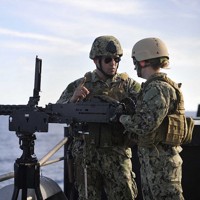With budgetary constraints looming and global priorities shifting, the U.S. military is in the process of pursuing leaner and more adaptive ways to achieve U.S. national security objectives around the globe. This effort is in accordance with the Department of Defense’s (DOD) 2012 Defense Strategic Guidance (.pdf), which recognizes the need for the military to rebalance toward the Asia-Pacific region and sustain its focus on the Middle East, while maintaining current defense commitments in other parts of the world. One of the new approaches being developed is the Regionally Aligned Brigade concept, through which each regional combatant command (COCOM) would be assigned an Army brigade to advise, train and mentor partner nation security forces throughout their respective areas of responsibility (AORs).
In fiscal year 2013, the pilot rotation for the Regionally Aligned Brigade concept will be conducted by U.S. Army Africa, the Army component of U.S. Africa Command (Africom). This means that for the first time since it was established as a unified combatant command in October 2008, Africom will have assigned forces that will deploy from bases in the continental United States to select locations in Africa on a rotational basis. More complex than simply “sending U.S. troops to Africa,” the Regionally Aligned Brigade concept indicates that the military recognizes the need to develop a more efficient force management system and explore a smaller, lighter concept of operations. In so doing, it will seek to maintain a global presence to address transnational threats while preserving lessons learned from working with local security forces in Iraq and Afghanistan over the past decade.
For several years, Africom’s lack of assigned forces and the fact that it had to compete with requests for forces from other COCOMs hindered its efforts to foster strong military-to-military relationships in Africa and expand partner capacity-building activities. The Regionally Aligned Brigade concept represents a force management system that is potentially more efficient, giving COCOMs a reliable source of manpower for short, training-focused missions. Ideally, a more predictable security cooperation planning process will allow Africom and other commands to be more responsive to the training requests of partner militaries and synchronize their planning processes with broader, nonmilitary U.S. government objectives in their AORs. While the single brigade assigned to Africom may be not be sufficient to meet the security cooperation needs of the 53 countries in its AOR, it is still an improvement over having to rely exclusively on the request for forces process, and could mitigate the current ad hoc nature of Africom’s theater security cooperation planning.

